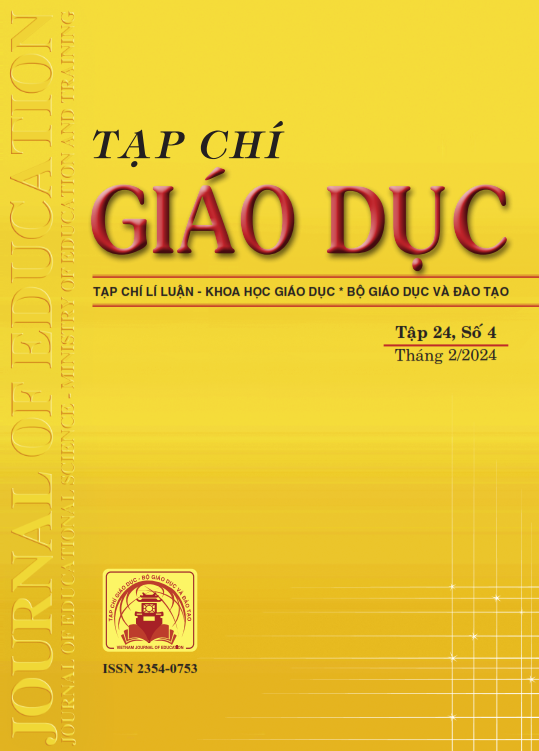Các tiêu chí đánh giá và định hướng phát triển năng lực số cho sinh viên sư phạm Việt Nam
Tóm tắt
Digital transformation and digital competency at higher education have been receiving great attention in the current period. With the strong development of science and technology, it is necessary for students in general and pedagogical students in particular to have adequate knowledge, skills and attitudes towards digital transformation to be ready for their future careers. Appropriate understanding of digital transformation, digital competences development, correct identification of key issues of digital transformation implementation and procedure, adequate digital competencies formation to swiftly improve training quality and efficiency are significant to tertiary education institutions in the current context. The article employs theoretical research methods involving literature collection and analysis to make comments related to the digital competencies of pre-service teachers to devise a digital competency framework for pedagogical students in association with contextual changes and characteristic circumstances of Vietnam. The research results are the basis for assessing the current state of digital competencies of pedagogical students and proposing innovative solutions towards flexible and updated training programs that meet social needs.
Tài liệu tham khảo
Aesaert, K., Vanderlinde, R., Tondeur, J., & van Braak, J. (2013). The Content of Educational Technology Curricula: A Cross-Curricular State of the Art. Educational Technology Research and Development, 61(1), 131-151.
Ala-Mutka, K. (2011). Mapping digital competence: Towards a conceptual understanding. Sevilla: Institute for Prospective Technological Studies, 7-60.
Almerich, G., Orellana, N., Suárez-Rodríguez, J., & Díaz-García, I. (2016). Teachers’ information and communication technology competences: A structural approach. Computers & Education, 100, 110-125. https://doi.org/10.1016/j.compedu.2016.05.002
Calvani, A., Cartelli, A., Fini, A., & Ranieri, M. (2008). Models and Instruments for assessing Digital Competence at School. Journal of e-Learning and Knowledge Society, 4(3), 183-193.
Clark-Wilson, A., Robutti, O., & Thomas, M. (2020). Teaching with digital technology. ZDM - Mathematics Education, 52(7), 1223-1242. https://doi.org/10.1007/s11858-020-01196-0
Đỗ Văn Hùng (chủ biên), Trần Đức Hòa, Nguyễn Thị Kim Dung, Bùi Thanh Thủy, Nguyễn Thị Kim Lân, Đào Minh Quân, Đồng Đức Hùng, Bùi Thị Ánh Tuyết, Bùi Thị Thanh Huyền, Trần Thị Thanh Vân, Trịnh Khánh Vân (2022). Năng lực số 2022: Khung năng lực số dành cho sinh viên. NXB Đại học Quốc gia Hà Nội.
Erstad, O. (2015). Educating the Digital Generation. Nordic Journal of Digital Literacy, 5(01), 56-71.
European Parliament and the Council (2006). Recommendation of the European Parliament and of the Council of 18 December 2006 on key competences for lifelong learning. Official Journal of the European Union, L394/310. Ferrari, A. (2012). DIGCOMP: A Framework for Developing and Understanding Digital Competence in Europe. Luxembourg: Publications Office of the European Union.
Ghomi, M., & Redecker, C. (2019). Digital Competence of Educators (DigCompEdu): Development and Evaluation of a Self-assessment Instrument for Teachers' Digital Competence. In CSEDU (1) (pp. 541-548).
Gudmundsdottir, G. B., & Hatlevik, O. E. (2018). Newly qualified teachers' professional digital competence: implications for teacher education. European Journal of Teacher Education, 41(2), 214-231. https://doi.org/10.1080/02619768.2017.1416085
Ilomaki, L., Paavola, S., Lakkala, M., & Kantosalo, A. (2016). Digital competence-an emergent boundary concept for policy and educational research. Education and Information Technologies, 21(3), 655-679.
Instefjord, E. (2015). Appropriation of Digital Competence in Teacher Education. Nordic Journal of Digital Literacy, 9(04), 313-329.
Instefjord, E., & Munthe, E. (2016). Preparing pre-service teachers to integrate technology: an analysis of the emphasis on digital competence in teacher education curricula. European Journal of Teacher Education, 39(1), 77-93.
Janssen, J., Stoyanov, S., Ferrari, A., Punie, Y., Pannekeet, K., & Sloep, P. (2013). Experts' views on digital competence: Commonalities and differences. Computers & Education, 68, 473-481. https://doi.org/10.1016/j.compedu.2013.06.008
JISC (2017). Building digital capabilities: The six elements defined. http://repository.jisc.ac.uk/6611/1/JFL0066F_DIGIGAP_MOD_IND_FRAME.PDF
Johannesen, M., Øgrim, L., & Giæver, T. H. (2014). Notion in Motion: Teachers’ Digital Competence. Nordic Journal of Digital Literacy, 9(04), 300-312.
Koc, M. (2013). Student teachers' conceptions of technology: A metaphor analysis. Computers & Education, 68, 1-8. https://doi.org/10.1016/j.compedu.2013.04.024
Krumsvik, R. J. (2008). Situated learning and teachers’ digital competence. Education and Information Technologies, 13(4), 279-290.
Krumsvik, R. J. (2014). Teacher Educators' Digital Competence. Scandinavian Journal of Educational Research, 58(3), 269-280.
McGarr, O., & Gavaldon, G. (2018). Exploring Spanish pre-service teachers’ talk in relation to ICT: balancing different expectations between the university and practicum school. Technology, Pedagogy and Education, 27(2), 199-209. https://doi.org/10.1080/1475939X.2018.1429950
Ng, W. (2012). Can we teach digital natives digital literacy? Computers & Education, 59(3), 1065-1078. https://doi.org/10.1016/j.compedu.2012.04.016
Ottestad, G., Kelentrić, M., & Guðmundsdóttir, G. B. (2014). Professional Digital Competence in Teacher Education. Nordic Journal of Digital Literacy, 9(04), 243-249.
Redecker, C. (2017). European framework for the digital competence of educators: DigCompEdu (No. JRC107466). Joint Research Centre (Seville site).
Røkenes, F. M., & Krumsvik, R. (2014). Development of Student Teachers’ Digital Competence in Teacher Education - A Literature Review. Nordic Journal of Digital Literacy, 4(9), 250-280.
Sadaf, A., Newby, T. J., & Ertmer, P. A. (2012). Exploring pre-service teachers' beliefs about using Web 2.0 technologies in K-12 classroom. Computers & Education, 59(3), 937-945. https://doi.org/10.1016/j.compedu.2012.04.001
Trần Đức Hòa, Đỗ Văn Hùng (2021). Khung năng lực số cho sinh viên Việt Nam trong bối cảnh chuyển đổi số. Tạp chí Thông tin và Tư liệu, 1, 2-21.
Tải xuống
Đã Xuất bản
Cách trích dẫn
Số
Chuyên mục
Giấy phép

Tác phẩm này được cấp phép theo Ghi nhận tác giả của Creative Commons Giấy phép quốc tế 4.0 .












